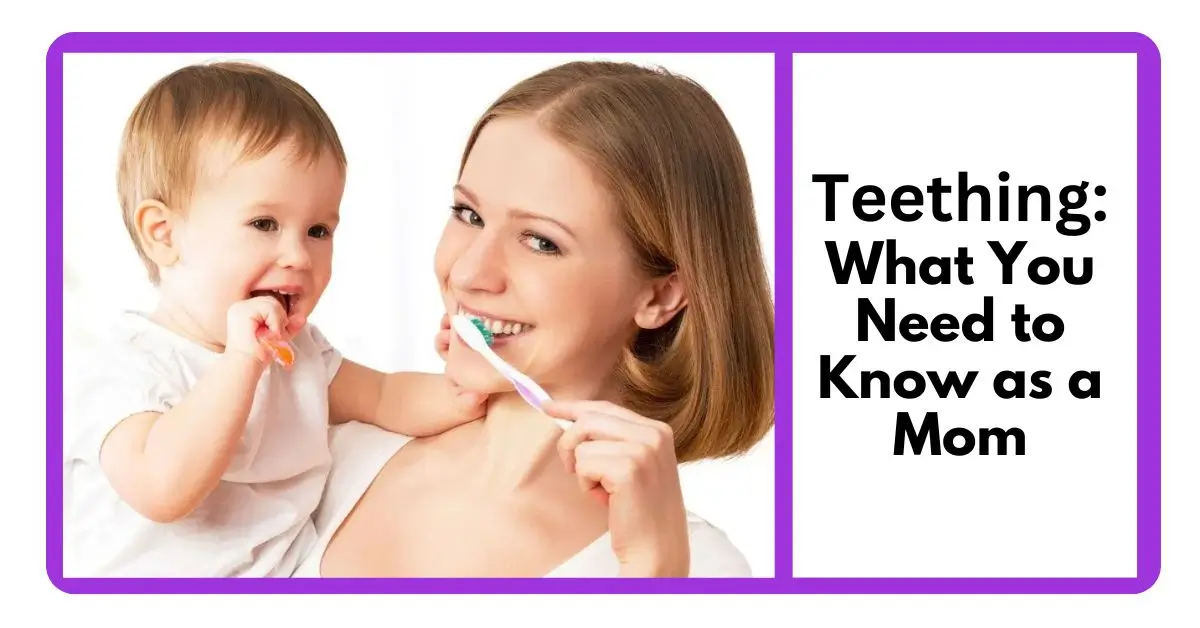In this Article;
What is Teething?
When do Babies Start Teething?
Symptoms/Common signs of teething
Teeth Eruption
Tips for Moms to Help During Teething
Caring for Yourself
As a new mom, watching your baby go through various developmental milestones is both exciting and challenging. One of these significant milestones is teething, a process during which your baby’s first teeth emerge from their gums.
Teething can be an uncomfortable and sometimes painful experience for your little one, and it often comes with a few challenges for moms as well.
In this article, we’ll explore what you need to know about teething and how to support your baby through this phase.
What is Teething?
Teething is the natural biological process in which an infant’s first set of teeth, commonly known as primary or baby teeth, begin to emerge and break through the gums.
When do Babies Start Teething?
This process typically occurs during the Sixth month to the first year of a child’s life, with the timing of teething varying from one baby to another.
As the teeth erupt, they gradually push through the gums, leading to various signs and symptoms such as increased drooling, gum discomfort, and a desire to chew on objects.
Teething can be an uncomfortable phase for babies, but it is an essential part of their dental development as they grow and mature.
Symptoms/Common signs of teething
These symptom are not same for children but they include the;
- Increased drooling: Babies may produce more saliva, leading to excessive drooling.
- Fussiness and irritability: Discomfort and pain in the gums can make babies more irritable and fussy than usual.
- Swollen and tender gums: The gums may appear red, swollen, and sensitive.
- Desire to chew: Babies often seek relief by chewing on objects, their fingers, or toys.
- Changes in feeding habits: Teething can affect a baby’s appetite or their willingness to breast
Teeth Eruption
Teeth usually emerge in a specific order. The bottom front teeth (central incisors) often appear first, followed by the top front teeth. Later, molars, canines, and back molars will come in.
- Duration: Teething can last for several months, with each tooth taking a few days to emerge.
Treatment To Avoid When Your Baby Is Teething
When a baby is teething, it’s important to provide them with comfort and relief from the discomfort associated with teething.
However, there are some treatments and remedies that should be avoided, as they may be unsafe for babies or could potentially worsen the situation. Here are some treatments to avoid when a baby is teething:
#1: Avoid Over-the-Counter (OTC) Teething Gels or Ointments:
OTC teething gels or ointments often contain benzocaine, lidocaine, or other numbing agents. These products can be harmful if ingested and may cause adverse reactions, including difficulty breathing or an allergic reaction.
#2: Steer Clear of Teething Necklaces or Bracelets
Teething necklaces or bracelets made of small beads or other materials can pose a choking hazard if they break or if a baby manages to put them in their mouth. They should be avoided.
#3: Do Not Use Aspirin
Never give aspirin to a baby for teething pain. Aspirin can cause a rare but serious condition called Reye’s syndrome, which can be life-threatening.
#4: Avoid Hard Objects
Refrain from giving babies hard objects to chew on, such as frozen teething or toys. These can damage a baby’s gums and teeth or pose a choking hazard if they break.
#5: Say No to Alcohol-Based Teething Remedies
Some parents have used alcohol-based teething remedies, such as whiskey on the baby’s gums. This is not safe and can be harmful to the baby’s health.
#6: Don’t Use Teething Tablets
Some teething tablets may contain ingredients that are not safe for babies. Additionally, the U.S. Food and Drug Administration (FDA) has warned against the use of some teething tablets due to concerns about their safety.
Tips for Moms to Help During Teething
As a mom, you play a crucial role in comforting and supporting your baby during the teething process. Here are some tips to help you navigate this phase:
#1: Offer Chewing Toys /Cold Compresses
Refrigerate a clean, wet washcloth or a teething ring. The cold sensation can soothe sore gums when your baby chews on it.
#2: Gentle Gum Massage
Using a clean finger, gently massage your baby’s gums to provide relief. Ensure your hands are clean before doing this.
#3: Avoid Over-the-Counter Remedies
Consult your pediatrician before using any over-the-counter teething gels or remedies, as some may not be suitable for babies.
#4: Distraction
Keep your baby engaged with activities or games to distract them from the discomfort.
#5: Proper Hygiene
Maintain good oral hygiene by wiping your baby’s gums with a clean, damp cloth even before teeth emerge. Once teeth appear, begin brushing them with a soft toothbrush and a tiny amount of fluoride toothpaste.
#6: Be Patient
Understand that teething is a natural process, and your baby’s discomfort will eventually pass. Provide plenty of love and reassurance during this time.
#7: Consult Your Pediatrician
If your baby seems unusually uncomfortable or experiences severe symptoms like a high fever, diarrhea, or a rash, consult your pediatrician to rule out other causes.
Caring for Yourself
Remember that caring for your baby during teething can be physically and emotionally taxing for you as a mom. Here are some tips for taking care of yourself:
- Rest: Ensure you get enough rest to maintain your energy levels and patience.
- Seek Support: Don’t hesitate to ask for help from friends, family, or your partner when you need a break.
- Stay Informed: Stay informed about the teething process and consult your pediatrician if you have concerns.
- Self-Care: Engage in self-care activities to reduce stress. This can include a warm bath, reading a book, or practicing relaxation techniques.
Teething is a natural part of your baby’s development, and while it can be challenging at times, it’s also an opportunity for bonding and nurturing your little one through a potentially uncomfortable phase.
By understanding the teething process and implementing these tips, you can provide the support and comfort your baby needs while maintaining your well-being as a mom.






